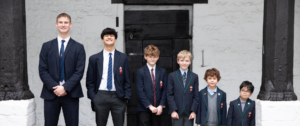Mutual respect is more than just politeness; it’s the recognition that every person deserves to be treated with dignity, regardless of their background, culture, or beliefs. It’s about seeing the humanity in others, no matter the situation.
One person who lived this principle was Takashi Nagai, a Japanese doctor and survivor of the Nagasaki atomic bomb. His life was a quiet yet profound example of what it means to respect others deeply and selflessly. During the war, Nagai served as a radiologist. On foreign deployments, he treated Chinese civilians and soldiers with the same care and compassion as he did his fellow Japanese. Despite the war, Nagai never allowed nationality to dictate his treatment. At a time where racial and national divisions were strong, he did not discriminate, treating everyone with the same kindness, even when the world told him otherwise.
After years of exposure to radiation from his work, Nagai was diagnosed with incurable leukaemia and given two years to live. His own health was deteriorating, but he did not stop working. He continued to X-ray and treat patients, knowing that each time he did, he was shortening his own life. But for Nagai, the lives of those he served were more important than his own suffering. He respected them enough to put their needs above his.
On the ninth of August 1945, the atomic bomb was dropped on Nagasaki; Nagai was gravely injured. His right side was torn apart by the blast, yet he did not hesitate. Even though his body was failing him, he rose to help others. Instead of searching for his wife or tending to his own injuries, he led a team of medics, providing first aid to the wounded. He knew that, in those desperate moments, people needed him. And he gave them everything he had.
This October, as we celebrate Black History Month, we recognise the profound impact of Black individuals who have courageously fought for justice and equality. I myself was fortunate enough to visit the Black Cultural Archives in Brixton. For me, this trip acted as a stark reminder that systemic racism has long diseased Britain. However, we must thank the countless individuals who have bravely fought against these injustices, paving the way for progress and equality. Their stories remind us that true respect transcends race and nationality, uniting us in our shared humanity. The riots this summer remind us we still have so far to go. But just as Takashi Nagai demonstrated compassion for all people during the horrors of war, we must learn from his example and extend that same kindness to one another.
In our school, we are fortunate to be part of a diverse community. We come from different places, hold different beliefs, and have unique stories to tell. Our diversity is our strength, but it also makes mutual respect essential. To thrive together, we need to see beyond our differences and recognise the value in each person.
Nagai’s actions weren’t just courageous, they were an extraordinary act of mutual respect. He understood that in that moment of devastation, nothing else mattered except the shared humanity between him and those around him. And to leave you in his very words, “We must rebuild with love, not with hatred. We must teach our children that all human beings are brothers and sisters.”
Georgie Paulson
Senior Prefect

